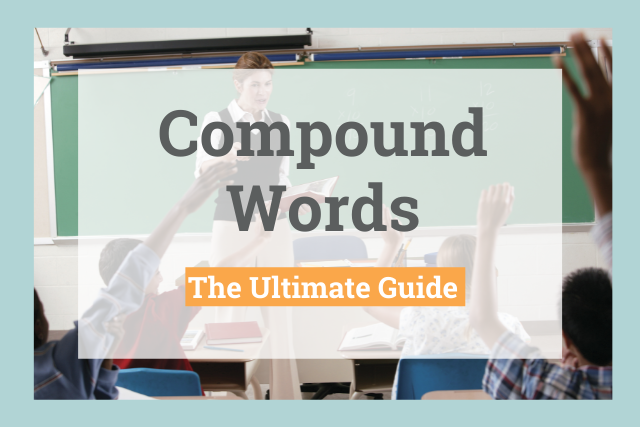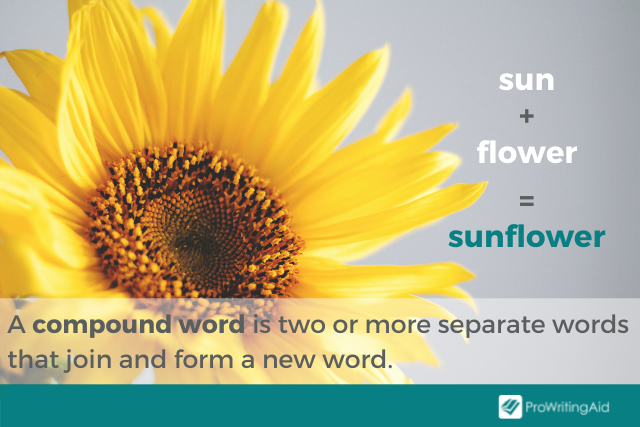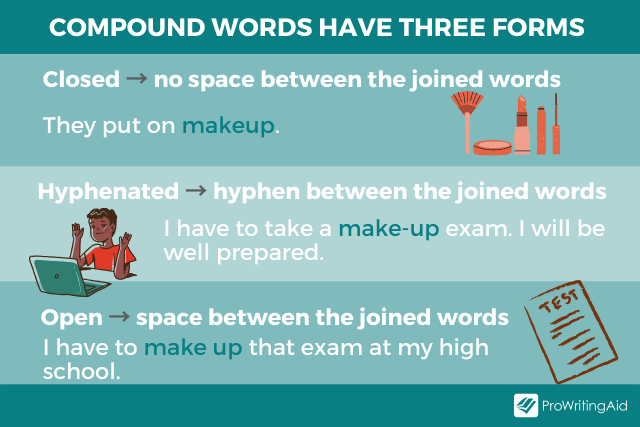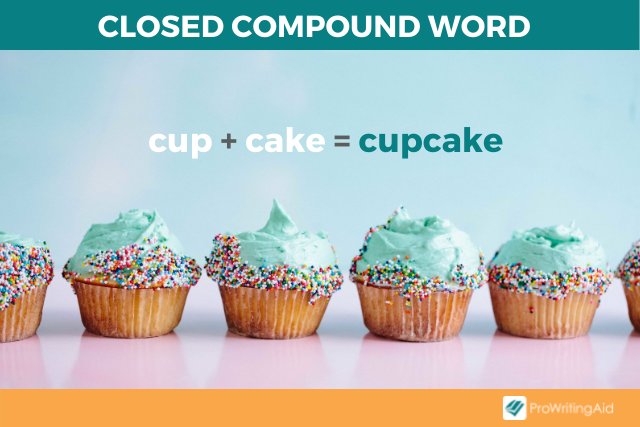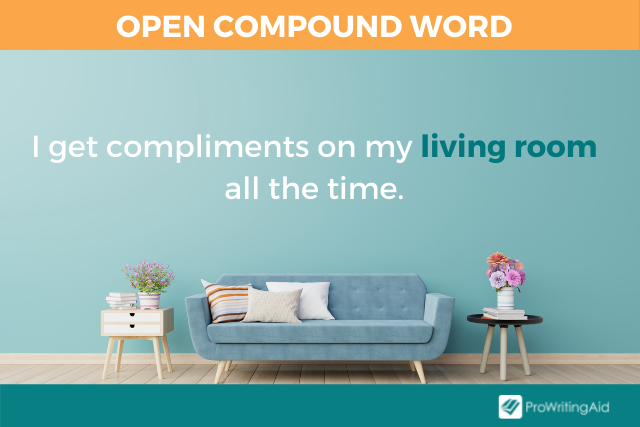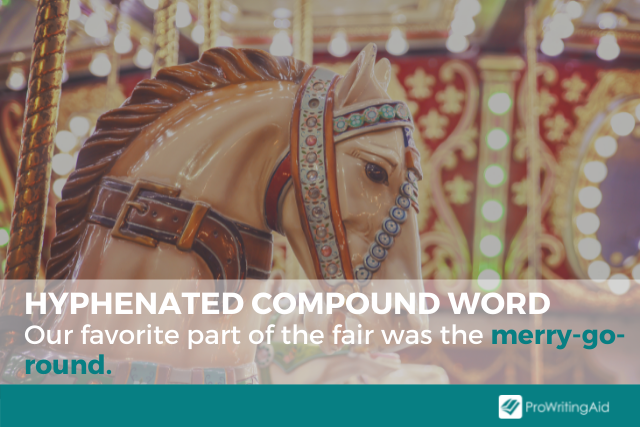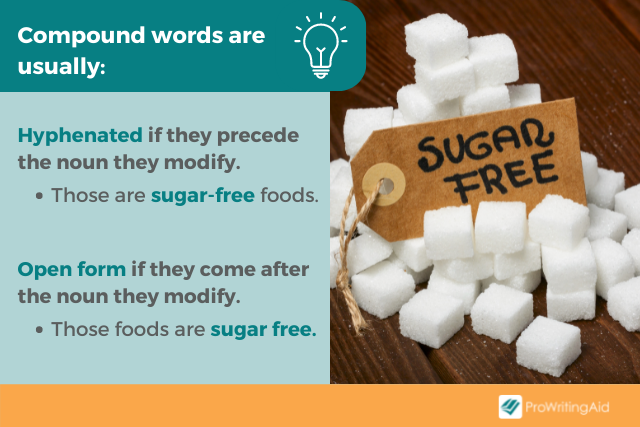Have you ever wondered how you would construct a sentence if there were no words? Luckily, for us, we have languages that have a wide range of vocabulary. Among the languages of the world, the English language is one that has a good vocabulary range. In addition to the words in English, there are also words borrowed from other languages called loan words, and words that are formed by combining two different words to form compound words. In this article, you will be introduced to compound words, what they are, their meaning, definition, how to form compound words and how they can be used. Also, take a look at the examples given and the list of compound words to understand how they can be formed.
Table of Contents
- What Is a Compound Word? – Meaning and Definition
- Types of Compound Words
- Open Compound Words
- Closed Compound Words
- Hyphenated Compound Words
- Points to Remember When Forming Compound Words
- Formation of Compound Words
- Examples of Compound Words
- List of Commonly-Used Compound Words in English
- Test Your Understanding of Compound Words
- Frequently Asked Questions on Compound Words in English
What Is a Compound Word? – Meaning and Definition
A compound word, as the name suggests, is a combination of two or more root words. They are combined to form words which mean something different from what the individual words mean.
A compound word, according to the Oxford Learner’s Dictionary, is defined as “a noun, an adjective or a verb made of two or more words or parts of words, written as one or more words, or joined by a hyphen.” The Cambridge Dictionary defines a compound word as “two or more words linked together to produce a word with a new meaning.” A compound word is defined as “is one that is made up of two or more words”, according to the Collins Dictionary.
Types of Compound Words
Compound words can be formed in three different ways. They are:
- Open compound words
- Closed compound words
- Hyphenated compound words
Let us look at how each of these types of compound words are formed.
Open Compound Words
Open compound words are those that are formed by combining two or more words which can be written as separate words and still be used together as a compound word. Open compound words are mostly formed by combining an adjective and a noun to form a compound noun.
For example:
- First aid
- Post office
- Living room
- High school
- Ice cream
Closed Compound Words
Closed compound words are those that are formed by combining two words but do not contain any space between them, unlike open compound words.
For example:
- Bedroom
- Keyhole
- Football
- Backspace
- Armchair
Hyphenated Compound Words
Hyphenated compound words, as the name suggests are words formed by combining two or more words with a hyphen placed between them. Hyphenated compound words mostly function as compound adjectives.
For example:
- In-depth
- Snow-clad
- One-footed
- Sun-dried
- Day-to-day
Points to Remember When Forming Compound Words
Have you tried merging two or more words that mean completely different things? If you do, you will find out that some interesting combinations work, mean something different from what their individual meanings are and make your language a lot more interesting and colourful. Now, there is something you should know. You cannot just combine any two words together to form a word. Make sure you make proper compound words and use them appropriately. Here are a few points you will have to bear in mind when forming and using compound words.
- Compound words can be said to be permanent compounds or temporary compounds. Permanent compound words are those that are already a part of the language; whereas, a temporary compound word is one that is formed to suit the writer’s or speaker’s requirement. For example, words like first aid, grandmother, lawsuit, blackboard, etc. are permanent compound words which already exist in the English language and words like red-headed, left-handed, bright-eyed, etc. are the kind of words that can be created to suit the requirement of the language user.
- To help you a little, here is something you can remember. In most cases, compound nouns are written as a closed compound word, a compound verb is written as an open compound word and a compound adjective is written as a hyphenated compound word. However, this is not a rule and is not always the case.
- As far as hyphenated compound words are concerned, they are hyphenated only if they are placed before the noun it modifies.
Formation of Compound Words
Compound words, as discussed earlier, are formed by combining two words, especially two parts of speech. Let us look at some combinations of parts of speech that form compound words.
Noun + Noun
Here is a list of compound words formed by combining two nouns.
- Bedroom
- Music band
- Water tank
- Starfish
- Sunflower
- Girlfriend
- Police woman
- Football
Noun + Verb
Here is a list of compound words formed by combining a noun and a verb.
- Firefly
- Rainfall
- Sunset
- Photoshoot
- Sunrise
- Raindrop
- Haircut
- Snowfall
Verb + Noun
Here is a list of compound words formed by combining a verb and a noun.
- Swim suit
- Typewriter
- Postman
- Post office
- Notebook
- Breakfast
- Proofread
- Babysit
Verb + Preposition
Here is a list of compound words formed by combining a verb and a preposition.
- Takeaway
- Shutdown
- Drawback
- Checkin
- Checkout
- Lookout
- Takedown
- Breakup
Preposition + Verb
Here is a list of compound words formed by combining a preposition and a verb.
- Intake
- Outdo
- Input
- Output
- Overthrow
- Understand
- Underestimate
- Overlay
Noun + Adjective
Here is a list of compound words formed by combining a noun and an adjective.
- Housefull
- Heartbroken
- Spoonful
- Wireless
- Lifelong
- Snow white
- Sky blue
- Worldwide
Adjective + Noun
Here is a list of compound words formed by combining an adjective and a noun.
- Greenhouse
- Blackboard
- Full-time
- Superhero
- Hot dog
- Blacksmith
- Long-term
- Last minute
Gerund + Noun
Here is a list of compound words formed by combining a gerund and a noun.
- Washing machine
- Dining room
- Swimming pool
- Driving licence
- Breaking point
- Melting point
- Living room
- Working day
Noun + Gerund
Here is a list of compound words formed by combining a noun and a gerund.
- Sightseeing
- Mind-blowing
- Nerve-wrecking
- Nail-biting
- Brainstorming
- Mindmapping
- Air conditioning
- Time-consuming
- Bird watching
Preposition + Noun
Here is a list of compound words formed by combining a preposition and a noun.
- Underworld
- Overview
- Undergraduate
- Oversight
- Bystander
- Afterlife
- Background
- Forehead
- Upstairs
Taking a look at a number of examples will definitely help you out. So here is a list of some of the most common compound words used in English.
List of Commonly-Used Compound Words in English
| Compound Words | ||||
| Blackboard | South-west | North-east | Indo-European | Afro-American |
| First aid | Bedroom | Bathroom | Washing machine | Vending machine |
| Living room | Swimming pool | Drawing room | Copyright | Typewriter |
| Managing director | Day-to-day | Blood pressure | Cold blooded | Eye opener |
| Microorganism | Cupboard | Footnote | Locksmith | Blacksmith |
| Goldsmith | Giveaway | In-depth | Breakup | Breakdown |
| Blowout | Housefull | Showdown | Long term | Sunflower |
| Dilly dally | Postman | Post office | Breakfast | Notebook |
| Superhero | Hot dog | Full moon | Merry-go-round | Grandfather |
| Mother-in-law | Father-in-law | Sister-in-law | Brother-in-law | Granddaughter |
| Grandson | Grandchild | Good-hearted | Last minute | Real estate |
| Mind-blowing | Far-fetched | Warmup | Firefly | Butterfly |
| Grasshopper | Blueberry | Strawberry | Half-baked | Raincoat |
| All-nighter | Know-it-all | Smartphone | Starfish | Runway |
| Toothbrush | Time table | Hopscotch | Uptown | Eyeball |
| Keyboard | Cupcake | Homework | Underground | Popcorn |
| Daydream | Nightmare | Midnight | Downstairs | Upstairs |
| Parking lot | Worksheet | Snow white | Keypoint | Handout |
| Raindrop | Hometown | Extracurricular | Network | French fries |
| Brainstorm | Teaspoon | Table spoon | Handbag | Earthworm |
| Greenhouse | Milkshake | Farewell | Showoff | Newsletter |
| Subway | Pathway | Deadend | Homemade | Handmade |
| Peanut | Jellybean | Afternoon | Namesake | Foolproof |
| Waterproof | Soundproof | Policeman | Scarecrow | Passport |
| Forearm | Eyebrow | Nose ring | Earring | Staircase |
Test Your Understanding of Compound Words
Use the following words to form open, closed or hyphenated compound words.
|
|
|
|
|
|
|
|
|
|
|
|
|
|
|
|
|
|
|
|
Given below are the list of compound words formed by combining the given list of words.
1. Homesick
2.Hand-written
3. White-washed
4. Well-known
5. Haircut
6. Half-sister
7. Flashcard
8. Right-handed
9. Laptop
10. Broad-minded
Frequently Asked Questions on Compound Words in English
Q1
What are compound words?
Compound words, as the name suggests, are a combination of two or more root words. They are combined to form words which mean something different from what the individual words mean.
Q2
What is the definition of a compound word?
A compound word, according to the Oxford Learner’s Dictionary, is defined as “a noun, an adjective or a verb made of two or more words or parts of words, written as one or more words, or joined by a hyphen.” The Cambridge Dictionary defines a compound word as “two or more words linked together to produce a word with a new meaning.” A compound word is defined as “is one that is made up of two or more words”, according to the Collins Dictionary.
Q3
What are the three types of compound words?
- Open compound words
- Closed compound words
- Hyphenated compound words
Q4
What is an open compound word?
Open compound words are those that are formed by combining two or more words which can be written as separate words and still be used together as a compound word. Open compound words are mostly formed by combining an adjective and a noun to form a compound noun.
For example: First aid and post office
Q5
What is a closed compound word?
Closed compound words are those that are formed by combining two words but do not contain any space between them, unlike open compound words.
For example: Bedroom and keyhole
Q6
What is a hyphenated compound word?
Hyphenated compound words, as the name suggests are words formed by combining two or more words with a hyphen placed between them. Hyphenated compound words mostly function as compound adjectives.
For example: In-depth and snow-clad
Q7
Give some examples of compound words.
- Living room
- High school
- Ice cream
- Football
- Backspace
- Armchair
- One-footed
- Sun-dried
- Day-to-day
The words pancake, living room, and merry-go-round have something in common.
They are all examples of compound words.
The noun compound means something made up of two or more separate components. Compound can also be an adjective meaning consisting of two or more parts or components.
A compound word is one word, or one unit of meaning, that is created by joining two or more separate words together.
What Are Compound Words?
A compound word is a word made up of usually two but sometimes more words that are joined together. The two (or more) that make the compound word are independent words; they have their own distinct meanings. When those words are joined and form a compound word, that compound word has its own new meaning.
The Three Types of Compound Words
Compound words can take three possible forms: closed, open, or hyphenated. In closed form, there is no space between the joined words. In open form, there is a space between the “joined” words that still act as one unit, and in hyphenated form—you guessed it! There is a hyphen between the joined words.
These general “rules”—which are somewhat fluid and flexible—provide guidance as to what format a compound word takes.
-
Closed compound words are usually nouns: They put on makeup.
-
Open compound words are usually nouns or verbs: I have to make up (verb) that exam at my high school. (noun)
-
Hyphenated compound words are usually adjectives or adverb-adjective combinations: I have to take a make-up (adjective) exam. I will be well-prepared. (adverb + adjective)
The key word in each of those examples is “usually.” Some compound words break the rules. We’ll see how soon.
1. Closed Compound Words
To review: closed compound words are usually made up of two separate words that are put together to form a new word. There is no space between the two words in a closed-form compound word; the compound appears as one single word.
Examples of Closed Compound Words
-
Cup + cake becomes cupcake
-
Basket + ball becomes basketball
-
Key + board becomes keyboard
-
Extra + ordinary becomes extraordinary
-
Birth + day becomes birthday
You can see through these examples that the meaning of the compound word is not just a merger of the independent definitions of the individual words that join together to make that compound.
However, there is a relationship between the individual word meanings and the compounds. Compound words have been integrated into language as speakers have discovered those relationships. It makes perfect sense to call a cake that could fit into a cup a cupcake and to call a ball thrown through a basket (now a hoop) a basketball.
The rules for compound words, listed earlier in the post, include the word usually. That word means the rules are not hard and fast, and there are examples of compound words that break those rules.
For example, compound words that are verbs are usually open form, but here are rule-breaking closed-form compound verbs that remind us to hold those rules loosely:
-
I need to proofread my essay.
-
I think the clerk shortchanged me.
-
I have to babysit my little sister.
2. Open Compound Words
In an open compound word, there is a space between the two independent words, though they are still treated as one unit with a new “compound meaning.”
Examples of Open Compound Words
-
Living room: as a unit, this compound noun refers to a room in a house.
-
High school: as a unit, this compound noun refers to a school that has students in grades 9-12.
-
Post office: as a unit, this compound refers to a building where mail is collected, sorted, and sent.
-
Give up: as a unit, this compound verb means to stop trying.
-
Ask for: as a unit, this compound verb means to request something.
3. Hyphenated Compound Words
Hyphenated compound words have hyphens between each of the independent words that serve as connectors. The hyphens are a visual cue that the words form one unit.
Some compound words are always hyphenated.
-
Merry-go-round
-
Mother-in-law (and brother-, sister-, and father-in-law)
-
Self-esteem
Did you notice that all of those examples are nouns? Remember: the rules are flexible!
Examples of Hyphenated Compound Adjectives:
When compound words are used as adjectives (officially known as compound adjectives), the hyphenation rules change depending on where the compound adjective comes in the sentences.
If the compound adjective comes before the noun it modifies (describes), you should usually add a hyphen:
-
High-speed chase
-
Part-time employee
-
Full-time job
-
Fire-resistant pajamas
-
Good-looking person
-
Well-respected politician
-
Up-to-date records
Of course, there are exceptions. Remember, those “rules” are flexible. Some compound adjectives that precede the nouns they modify never take a hyphen. For example, ice cream and high school:
- High school students
- Ice cream sundae
There’s really no “why” to explain these exceptions; we’ve just adopted these forms and made them part of our language.
Examples of Open-Form Compound Adjectives
If the compound adjective comes after the noun it modifies, the hyphen is usually omitted.
-
Make sure the files are up to date. “Up to date” modifies, but comes after, the noun “files.”
-
The cat is two years old. “Two years old” modifies, but comes after, the noun “cat.”
Though post-noun modifiers don’t technically take hyphens, according to Merriam-Webster, usage trends indicate the hyphens are often included anyway, if the compounds “continue to function as unit modifiers.” So there’s that flexibility again.
What About Adverb Compounds?
It’s easy to find examples of closed, open, and hyphenated adverbs.
As for the closed-form examples, we probably don’t even register them as compound words much of the time.
-
Sometimes
-
Thereafter
-
Somewhere
Open-form adverbs occur when the adverb is the first word in the compound and ends in —ly. You should not hyphenate after an —ly adverb.
-
We made the discovery early on.
-
Her opinion is highly regarded.
-
They entered the dimly lit room.
What to Do If You’re Not Sure Which Form Is Right
While those flexible rules can help you, there may still be times when you feel confused about which compound form to use. Don’t stress too much.
According to Merriam Webster, the rules are more like patterns. You may see differences in different publications depending on editorial choice and style. For example, I looked on Amazon for a teapot. I saw mostly teapots, but also a few tea pots. Out of curiosity I put “tea pot” into a New York Times search bar, and found articles from the 1800s that included “tea-pot” in the title!
While interesting, those stylistic changes and choices shouldn’t be too surprising. Language is fluid and ever-evolving. Compound words themselves are proof of that evolution.
Keep Clarity the Focus
The purpose of hyphens in compound words is to ensure clarity. For example,
-
I bought over-the-counter medication.
-
He passed the medicine over the counter.
In the first example, I know by the hyphen that the medicine «I» bought did not require a prescription. «Over-the-counter» is one unit—one compound—describing a type of medicine.
In the second example, «over the counter» is serving another purpose and, while the words form a phrase to tell me where «he» passed the medicine, hyphens do nothing to make the purpose of the phrase clear and are therefore unnecessary.
Now look at these examples:
- He owned a little-used car.
- He owned a little used car.
In the first example, I know the man owns a car that has not been driven much. The car is described by the compound modifier «little-used.»
In the second example, it seems that the man owns a used car that is also small, or little. In this example, putting a comma after «little» would help to separate the two words, «little» and «used,» and show that they aren’t intended to work as a compound.
ProWritingAid Can Help
Though you’re a compound-word expert now, if you find yourself with lingering doubts, remember that ProWritingAid is here to help. It will let you know if you’ve added an unnecessary hyphen after an -ly adverb, or if you’ve left one out of a pre-noun compound adjective. You don’t have to write alone!
Take your writing to the next level:
20 Editing Tips from Professional Writers
Whether you are writing a novel, essay, article, or email, good writing is an essential part of communicating your ideas.
This guide contains the 20 most important writing tips and techniques from a wide range of professional writers.
The word compound means one thing that is composed of two or more elements. When you hear the word compound, you might think of a chemical compound, compound interest, or you might just use the word as a synonym for a mixture. Compounding is also a grammatical phenomenon, and there is a lengthy list of compound words in the English language.
Compound Words Definition
Simply put, compound means one thing made of many things. The definition for compound words means just that.
Compound words: two or more words joined to create a new meaning.
Compound words are not two random words thrust together. Compound words will be two words that are frequently found together, such as late-night, nice-looking, or seafood.
Compound words are usually two base words used together. Remember, base words are standalone words that signal a particular meaning, even when stripped of affixes (example: success in successful).
That’s not to say, however, that compound words can’t use derived words. Derived words are words that are built on a root, typically with the addition of an affix (example: teach + er = teacher). Many compound words include derived words (coffee maker, sewing machine, skyscraper).
The process of compounding is different from derivation and inflection — both of which typically involve adding an affix to change a word’s grammatical category. While derivation, inflection, and compounding are all a process for creating new words, compounding uses two base words, rather than a single base word and an affix (e.g., -ing, im—, or -ed).
Compounding in English Examples
Compounds help us understand words as a single unit, which in some cases helps to clarify the meaning of a word or phrase in English.
Let’s look for a vegan-friendly restaurant.

Using a hyphen here shows the reader that the words vegan and friendly should be taken as a single unit. Otherwise, it might be read as, “Let’s look for a vegan friendly restaurant,” with vegan and friendly being two different adjectives to describe a restaurant.
When new things, ideas, or phrases come into the collective consciousness of the public, they need a name or something people can say to refer to them. Compounding words is one of the most (if not the most) common types of word formation in English because it is so easy to do.
These new words can be figurative like chairman (the head of a committee or group, not a chair-shaped man), or simply a combination of the meaning of each of the base words, like lighthouse (a house of light).
Just email me, and I’ll respond to it later.
The word email wasn’t used until the late twentieth century because email, or electronic mail, didn’t exist until then. There was a need to create a word to communicate this new idea of sending a message electronically, and e-mail —which became email, without the hyphen — was a simple option.
Types of Compound Words
There are three types of compound words: open, closed, and hyphenated.
Open Compounds
Open compound words are formed by combining an adjective with the noun it modifies to create a new noun. These compound words are usually the result of two words being so frequently used together that they eventually come to mean one specific thing.
Shopping cart
Potting soil
Real estate
Even though these words are separated with a space, they’re still considered a single unit. You can tell it’s an open compound word, rather than merely a noun modified by an adjective, because the two words are so regularly used together to mean something specific.
For example, real is not used as the modification of the word estate to express it’s real as opposed to a fake estate. Real estate is the business of buying and selling property and buildings on said property.
Closed Compounds
Closed compound words look the most like a “real word” because there is no space between the two roots.
Keyboard
Pothole
Tablecloth
Two words might form a closed compound because they are so frequently used together.

In the 1990s when someone wanted to connect to the internet, they might say they were going to go on-line (cue the sounds of dial-up internet and a male voice saying, “You’ve got mail”). Today in the twenty-first century, the internet is a part of our everyday experience, and so the word has lost its hyphen and is typically shortened to online.
Hyphenated Compounds
The final type of compound words are hyphenated compounds. These are words that — just like closed and open compounds — are frequently used together. The hyphen connects these words, so they function as one unit.
A hyphen (-) is a punctuation mark that shouldn’t be confused with a dash (–). A hyphen connects two words or word parts, whereas dashes indicate a pause or range. Dashes can be short (an “en dash” which is the length of the letter n) or long (an “em dash” which is the length of the letter m).
Long-term
Close-up
Empty-handed
Many hyphenated compounds become closed compounds if they’re used frequently enough.
Hyphenating Compound Words
You might wonder, “How do I know when to hyphenate a compound word?” There are many rules regarding hyphens in general, and here are the ones that are key in hyphenating compound words.
-
Only hyphenate when the compound comes before the noun it will modify. If it comes after, don’t include a hyphen.
The man-eating bear was only a few yards away. vs. The bear was definitely a man eater.
-
When a compound modifier contains an adverb ending in -ly and a participle or adjective, don’t use a hyphen.
A highly contested race.
Unfortunately, there is not always a consensus about whether to hyphenate compound words or create a closed compound word. If you’re ever in doubt about whether to hyphenate a compound word, consult a dictionary or the appropriate style guide for a definitive answer.
Compound Words List
Here is a longer compound words list for reference.
Open Compound Words
-
Sun room
-
Cheer up
-
Summer break
-
Garage sale
-
Dress up
-
Fire pit
-
Jumping jack
-
Science fiction
-
Vice President
-
Swimming pool
Closed Compound Words
-
Dishware
-
Bookstore
-
Seatbelt
-
Birthday
-
Carpool
-
Limelight
-
Comeback
-
Candlelit
-
Football
-
Lawsuit
Hyphenated Compound Words
-
House-of-mirrors
-
Self-contempt
-
Father-in-law
-
Well-read
-
Full-length
-
Free-fall
-
High-rise
-
Life-size
-
Deep-fried
-
Right-handed
Compounding — Key takeaways
- Compound words are two or more words joined to create a new meaning.
- Compound words are usually two base words used together.
- Compounds help us understand words as a single unit, which in some cases helps to clarify the meaning of a word or phrase.
- There are three types of compound words: open, closed, and hyphenated.
- There is not always a consensus about whether to hyphenate compound words or create a closed compound word.
Anybody Can Learn About Compound Words. Here’s Everything You Need To Know
powered by
LanguageTool
Compounds words are when two or more words are joined together, creating a new word. Read on to learn about the many types of compound words.
Correct Use
- Compound words are when two or more words are joined, creating a different word with another distinct meaning.
- There are different types of compound words: open (high school), closed (grandmother), or hyphenated (two-fold).
- Compound words include compound nouns (stereotype), compound adjectives (everlasting), and compound verbs (greenwash).
What do a honeybee, butterfly, earthworm, and jitterbug have in common? That they’re all insects? Nope! That they’re compound words. We’ll teach you everything you need to know about compound words, from what they are to the different types.
Think of the word fire. You might be picturing something similar to flames of bright light, heat, and smoke. Now, think of the word fighter. You’re most likely thinking of something or someone that fights, like a boxer or soldier. Now, put these two words together: firefighter. What do you imagine? A person whose career is to put out and extinguish fires. This is an example of a compound word—two words with separate meanings combined to create an entirely new word.
Types of Compound Words
There are a few types of compound words, including:
- Compound nouns
- Compound adjectives
- Compound verbs
These can be written as either open, closed, or hyphenated compounds. Open compounds are compounds that have a space between each word (e.g., full moon). Closed compounds don’t have a space (e.g., daybed), and hyphenated compounds have a hyphen separating each word (e.g., up-to-date).
Compound Nouns
A compound noun is made up of a noun plus another noun. Take moonlight as an example. However, compound nouns are also made using other parts of speech, like verbs and adjectives.
Think of the word haircut. Hair on its own is a noun. Cut is often used as a verb, but when you put those two words together, it becomes a noun again. Please note that the order of a compound noun is not limited to noun + noun, or noun + other parts of speech. Many combinations can produce a compound noun. For example, a verb + a noun can also create a compound noun (e.g., swimsuit).
There are opened, closed, and hyphenated compound nouns. Below are a few examples of each.
| Open | Closed | Hyphenated |
|---|---|---|
| Black eye (adjective + noun) |
Payday (verb + noun) |
Check-in (verb + preposition) |
| Slam dunk (verb + noun) |
Lookout (verb + adverb) |
Well-being (noun + verb) |
| Quick fix (adjective + noun) |
Breakfast (verb + noun) |
Two-fold (noun + noun) |
| Washing machine (verb + noun) |
Skateboard (verb + noun) |
Take-out (verb + preposition) |
| Close call (adjective + noun) |
Turntable (verb + noun) |
Merry-go-round (adjective + verb + adverb) |
Often, many words start as open compound words, and eventually turn into closed compound words (e.g., notebook). There are a few standards that can be remembered to know whether a compound word should be opened, closed, or hyphenated. For example, a noun + noun compound word is usually closed (e.g., boyfriend). A compound word that uses a verb + “ing” is often written as an open compound (e.g., dry cleaning).
Compound Adjectives
Compound adjectives are two words joined into one to describe a noun (or compound noun). Like compound nouns, they can contain different parts of speech. Compound adjectives are mostly written with hyphens, but there are also opened and closed forms of these words.
Here are a few examples of compound adjectives:
- Noun + noun + adjective:
Last time she walked by the lake, she saw a seven-foot-long alligator.
- Adjective + noun:
They were in a long-distance relationship for seven years.
- Adverb + past participle:
A new school had to be built because the old one was overpopulated.
Quick Tip
As with most English language rules, the rules for compound nouns and compound adjectives are not set in stone. Knowing when to use what type of compound word takes practice and familiarization. Your best bet would be writing with an easy-to-use spell and grammar checker like LanguageTool. Not only will this writing assistant make sure you consistently use the correct form of a compound word, but it will also conveniently provide synonyms and offer stylistic improvements.
Compound Verbs
There are several types of compound verbs, like phrasal verbs, prepositional verbs, and helping verbs. Here, we are only going to focus on single-word compound verbs. Like in compound nouns and adjectives, these verbs are made by joining two words. Below are a few examples of compound verbs:
I was looking for someone who could babysit my kids for the weekend.
He was notorious for overcooking steaks.
For her birthday, she wanted to test-drive a new Ferrari.
I didn’t want to overstay my visit.
He had to sound-proof his apartment.
Keep in mind that compound verbs are usually written with a hyphen or as a closed compound.
When it comes to compound words, here’s what you should remember: There are many types, like compound nouns, adjectives, and verbs. These can come as open compound words (which have a space between the words), closed compound words (don’t have a space), and hyphenated compounds (the words are separated by a hyphen).
Many compound words have multiple acceptable ways of being written. Sometimes, they start with a space and through years of use, the space is eventually removed. The ambiguity of compound words is what makes them difficult to master. That’s why it’s worth reiterating that you should always have a user-friendly text editor like LanguageTool to help you get the correct spelling (and spacing) of compound words.
Unleash the Professional Writer in You With LanguageTool
Go well beyond grammar and spell checking. Impress with clear, precise, and stylistically flawless writing instead.
Get started for free
We Value Your Feedback
We’ve made a mistake, forgotten about an important detail, or haven’t managed to get the point across? Let’s help each other to perfect our writing.
Last Updated: April 7, 2022 | Author: John Curl
Simple words are words that can have one or more syllables, but in the case of a multisyllable word, the meaning of the word is not related to the meaning of any syllable.
What is compound words with examples?
This is when two nouns are combined to form a new noun. A compound noun is a type of compound word that is used to describe a person, place, or thing. For example, toothpaste, rain forest and sister-in-law are all compound nouns.
What are the example of simple and compound sentence?
The old man could neither see nor hear. He took the test several times but he couldn’t pass. He is famous, yet he is very humble. She was angry, still she kept her cool.
What is the difference between simple and compound words?
A simple sentence is a group of words that only consists of one independent clause. A compound sentence is a group of words that consists of at least two independent clauses.
What are the 10 example of compound?
Examples of some commonly used compounds and their molecular formula:
| Compound Name | Compound Formula |
|---|---|
| Acetic Acid | C2H4O2 |
| Sulphuric Acid | H2SO4 |
| Ammonia | NH3 |
| Methane | CH4 |
How do you teach compound words?
What is a simple sentence example?
A simple sentence has the most basic elements that make it a sentence: a subject, a verb, and a completed thought. Examples of simple sentences include the following: Joe waited for the train. The train was late.
How do you know if a word is simple?
Simple describes something as being easy to understand or do, as being plain or not elaborate, or as being ordinary or common. The word simple has many other senses as an adjective and a noun. If something is simple, it involves little challenge or will be really easy.
What are compound sentences 5 examples?
Compound Sentences
- I like coffee. Mary likes tea. → I like coffee, and Mary likes tea.
- Mary went to work. John went to the party. I went home. → Mary went to work, but John went to the party, and I went home.
- Our car broke down. We came last. → Our car broke down; we came last.
What is meant compound sentence?
A compound sentence is a sentence that connects two independent clauses, typically with a coordinating conjunction like and or but. They’re best for combining two or more self-sufficient and related sentences into a single, unified one.
What is a compound sentence for kids?
A compound sentence is formed when you join two main clauses with a connective. In a compound sentence the clauses are linked by coordinating conjunctions / connectives (and, but, so, or). I like bananas and I like grapes. Zoe can be rude at times but she is a nice girl.
What is a compound subject and a compound object?
A subject or an object of a sentence is compound if it describes 2 or more things or people. Examples. Compound Subjects. Mary and Jane went to the same school. In this sentence the subject describes 2 people, so it is a compound subject.
How do you write a compound sentence in English?
You create a compound sentence by joining independent clauses with coordinators and a comma, or with a semicolon. If you leave out the joining elements, you have a run-on sentence, which is harder to read and understand. Compound sentences add meaning and flow to your writing.
What are compound complex and simple sentences?
- A simple sentence consists of just one clause.
- A complex sentence consists of one independent clause and one or more dependent (subordinate) clauses.
- A compound sentence consists of two or more coordinate (independent) clauses.
- Exercise.
What is compound-complex sentence example?
This sentence shows the compound sentences of the two independent clauses “Jennifer sat in her chair” and “she read all evening,” combined by the coordinating conjunction “and.” The complex sentence stems from the independent clause “Jennifer sat in her chair,” and the dependent clause “which was a dark red recliner.”

